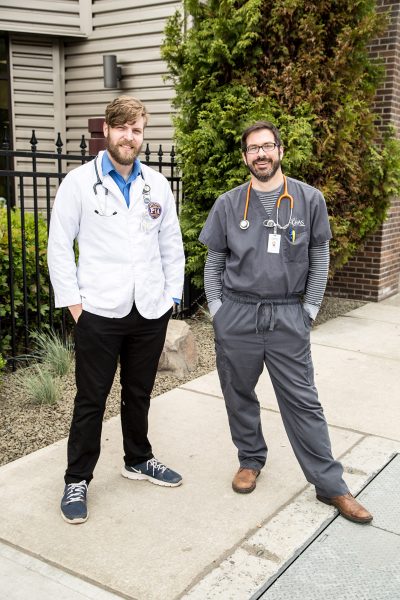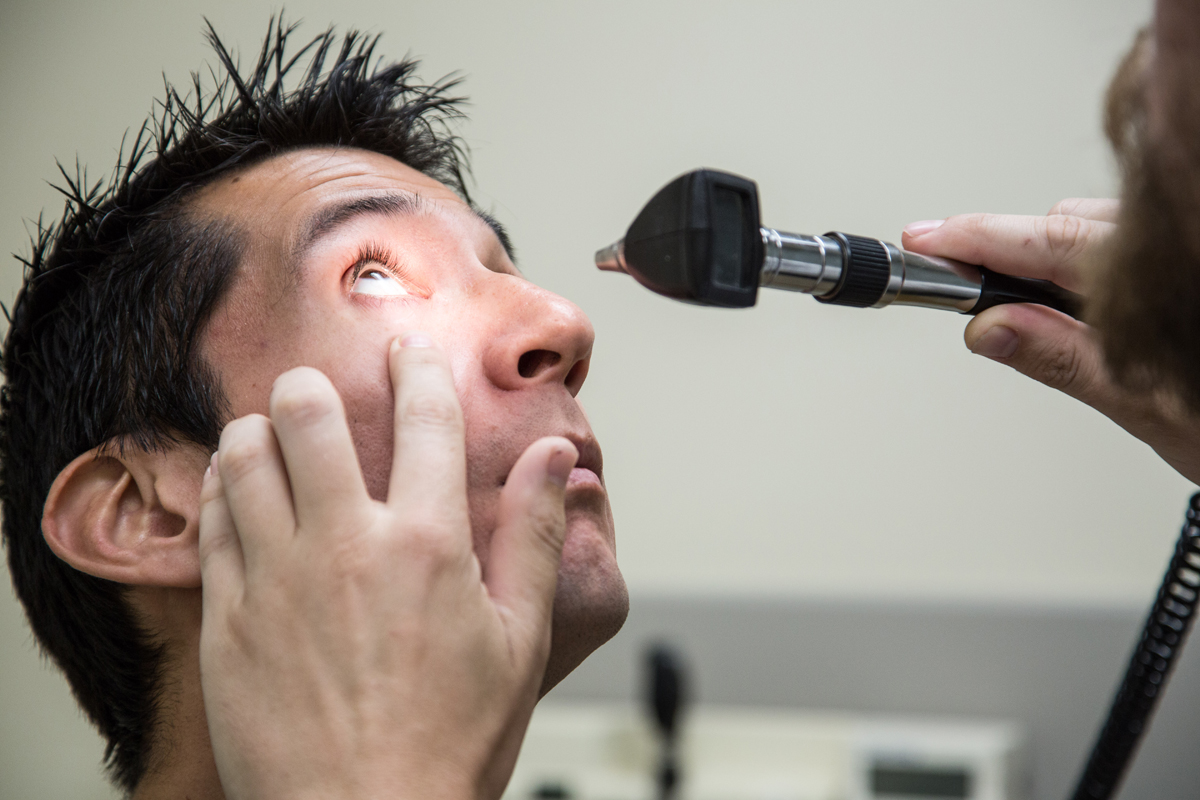We caught up with Ryan Jones earlier this summer in Spokane. A member of MEDEX Spokane Class 18, Ryan was two months into his 4-month family medicine rotation at the CHAS Denny Murphy Clinic on 2nd Avenue, in the heart of downtown Spokane. The last of the six rotations that every MEDEX student must complete during the clinical portion of their 27-month physician assistant training program, this one was proving to be a great way for Ryan to finish things up.
“I’m getting good follow-up,” he explains, “and starting to form relationships with patients, something that I never had the opportunity to do in the past. It’s neat. I like it a lot.”
In the seven years leading to Ryan’s move to Spokane to join Class 18, he lived on the southern Oregon coast and worked as a paramedic.
“I started as an EMT … well, I started as a forest service firefighter, and I ended up going to EMT school because it was a prerequisite at the fire academy. A local ambulance company called me and had me start as an EMT when fire season ended. I really liked that, and decided I wanted to go to paramedic school. So I did, and I worked on the rig as a paramedic for over seven years. We were the 911 coverage for Del Norte County, California, which includes all of Redwood National Park and lots of beaches. So I had lots of wilderness experience. Lots of crazy auto wrecks out there!”
Ryan goes on to describe both the upside and the downside to this line of work.
“I liked the fast pace and getting to help people and feeling like I was a valuable part of the community. I liked going through red lights with lights and sirens on. That was fun.”
Following a quick flash of a wry smile, Ryan continues.
“But then there was the scheduling. I worked 96 hours straight, four days on and four days off. I have three young children, and they didn’t like me being gone for four days at a time. Also the sleep schedule—you’re there for four days, you might be up all night, or maybe not the next time—it makes you grumpy on your days off. And it was fairly low compensation for what I was doing. I had to work an insane amount of hours to live a decent life.”
“I liked the fast pace and getting to help people and feeling like I was a valuable part of the community. I liked going through red lights with lights and sirens on. That was fun.”
Eventually the downside outweighed the upside for Ryan, and served as “motivation for me to move on.”
But how did “moving on” come to mean “becoming a PA” for Ryan?
“I knew several PAs from the emergency room, and during my final two years on the ambulance, I began working with a PA part time as an urgent care tech. That gave me more of a firsthand view of the role of the physician assistant, and solidified for me where I wanted to move my career.”
And MEDEX? How did he end up here?
“I only applied to MEDEX. I knew it was the program for me. I had talked to people applying to PA school before, and they said “Find the program that fits you, and getting in won’t be hard.’ I had done a lot of research, and I knew that MEDEX was the second program [in the nation, founded in 1967]. And that they hold to the history of the profession, which was taking all the medics from Vietnam who had developed these skill sets that were well beyond what they were trained for, and putting them to use. As a paramedic for 10 years on the rig, and then an urgent care tech after that, I felt very similar to the first people MEDEX was created for, and I knew MEDEX was the place for me.”
Returning to the present, we can’t help but observe what a shift he has undergone, from the demands of EMS work on the Oregon coast, to the demands of family medicine work that he is embedded in here in the heart of Spokane.
As I used to say, ‘ The best medicine on the ambulance is diesel,’ which was getting them to the hospital. Once you hand them off, it’s no longer your problem.
“As I used to say, ‘ The best medicine on the ambulance is diesel,’ which was getting them to the hospital. Once you hand them off, it’s no longer your problem. I do like being in this role where now it’s my job to figure out the problem, what’s going on, not just keep somebody breathing. It’s a lot more responsibility and a lot more critical thinking.”
Looking back over his clinical year, which included emergency medicine, orthopedic surgery, and behavioral health rotations, we ask Ryan what might have surprised him the most along the way.

Ryan Jones, MEDEX Spokane Class 18, with preceptor William Bomberger, PA-C, a graduate of MEDEX Yakima Class 8.
“You know, being on the truck for so long, I had seen a lot, so it’s hard to surprise me. One thing I have learned that has been surprising is how large a psychiatric component there is to this job, and how much mental health there is in day-to-day medicine. It’s just something I didn’t fully appreciate before, I think, before doing primary care in this rotation and seeing how many people have mental health diagnoses. The population we see here [at CHAS Denny Murphy] is fairly unique, located in central downtown Spokane, which I believe is the lowest rated for socioeconomic status in the whole county. It’s central downtown and we’re smack in the middle of it, and our patient population reflects that. I’m learning a lot about diabetes. I’m learning more about managing diabetes than I ever thought I would, and I’m becoming more comfortable doing it myself.”
As his MEDEX years wind down and he moves toward graduation, Ryan looks back at his time as a student fondly, and looks ahead with purpose.
“I feel like we have a very good group in Spokane Class 18. Everybody is very respectful of one another. There’s good camaraderie. There’s no bickering or drama, and everybody has helped each other out along this journey. I have nothing set in stone yet, but I would like to stay local. I’m dead set to practice emergency medicine. I’d like to take the PANCE (Physician Assistant National Certifying Exam) as soon as I possibly can, have a job lined up, and start working. That’s my plan for the next few months here.”










